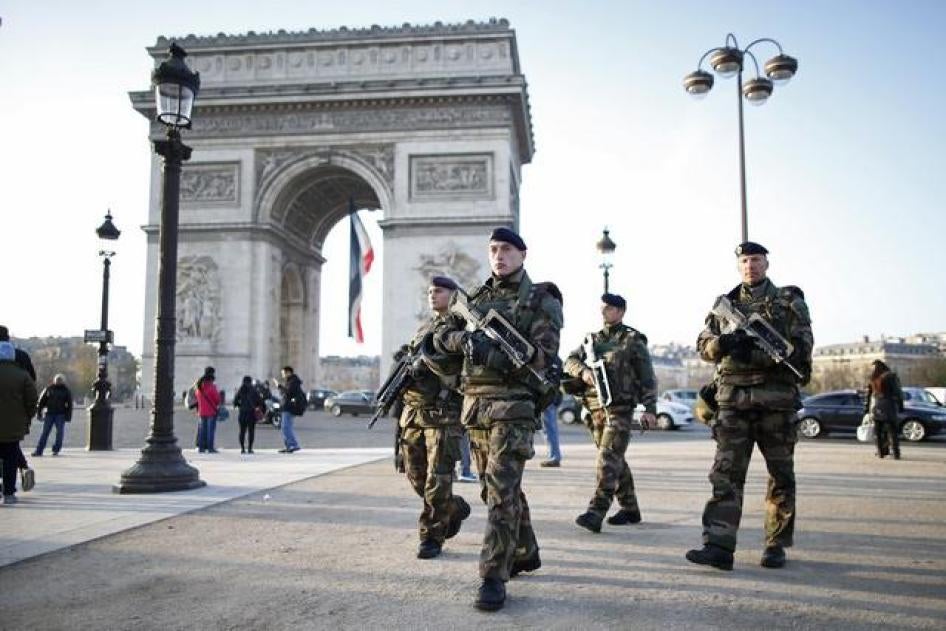Listening to the debate in Europe on the threat from the armed extremist group Islamic State (also known as ISIS), which has claimed credit for the Paris attacks, it feels like Europe has forgotten the central lesson from London in 2005 and the train bombings in Madrid the previous year. The power of these attacks lies in how society and -- above all -- the government responds.
The black-and-white presentation, the existential nature of the alleged threat (France has declared the first national state of emergency in decades), the notion that governments should stop at nothing in responding—these were all characteristic of the discussion on countering Al Qaeda, particularly in the wake of Madrid and London.
While we have yet to see evidence of a return to the dark days of torture and rendition of the last decade, that is where the logic of this approach risks leading us.
The fact that most of the identified Paris attackers are European citizens has intensified the debate about countering home-grown violent extremism. Such a threat in Europe is hardly new. The Basque-separatist group ETA, the Irish Republican Army and Greece’s November 17 are but three examples of its long tradition. The 2005 attacks in London were carried out by British citizens and long-term residents.
Those attacks prompted a large-scale effort in the UK to prevent radicalisation and recruitment, and reflection that the success of that effort depends on more than the efforts of the police and security services. The 2006 UK counterterrorism strategy emphasizes “[e]ngaging in the battle of ideas—challenging the ideologies that extremists believe can justify the use of violence, primarily by helping Muslims who wish to dispute these ideas to do so”.
Around the same time, NATO forces in Afghanistan and elsewhere were reflecting on the best ways to counter insurgent groups without alienating the civilian population. The 2006 US army counter-insurgency manual notes that “when insurgents are seen as criminals, they lose public support.” And it says that “illegitimate actions” – such as human rights abuses -- by the US undermine short- and long-term counter-insurgency efforts.
Common to these approaches is the centrality of what is often called the battle for “hearts and minds”, and the recognition that abusive measures are counter-productive—since they reinforce the narrative of groups like Al-Qaeda that the US and European governments are the enemies of Muslims, while undermining the legitimacy of those countries as committed to human rights and the rule of law.
Despite the fact that ISIS has the strategic objective of eliminating the “gray zone” of coexistence between Muslims and non-Muslims, there is a risk that the European governments will downplay the need to win hearts and minds in the post-Paris response.
Many of the measures adopted or under consideration are truly worrying. France has imposed a three-month state of emergency under a new law that allows for warrantless searches, and house arrest imposed by the executive—and has said it may extend it. The UK can now strip people of citizenship on ‘national security’ grounds even if it leads to statelessness, and France and Denmark are among the countries that do so to dual nationals purportedly involved in terrorism.
France, Germany and the UK confiscate passports to ban people from leaving their own country. Germany has enacted additional measures to confiscate national ID cards, while the UK can now, for up to two years, block the return of its citizens who travel overseas to join armed groups. And the UK government wants to expand already rampant mass surveillance.
The most effective way to combat terrorism while preserving core values remains the criminal justice system. Prosecuting fairly those who present a threat undermines their legitimacy while upholding the rule of law. It treats attackers like the criminals they are rather than the warriors they crave to be. By contrast, pre-emptive measures in the absence of concrete evidence are open to abuse, including profiling based on religious or community identity, and reinforce a perception of double standards.
Terrorism is a tactic of the weak—asymmetric warfare designed to provoke a strategic overreaction by the powerful. If it succeeds, societies become more closed and rights are curtailed, especially for groups perceived to be associated with the threat. If European governments forget the hard-learned lessons of the last decade and return again to anything-goes abusive measures, Europeans will be less safe, not more, and those who threaten us will be the victors.









